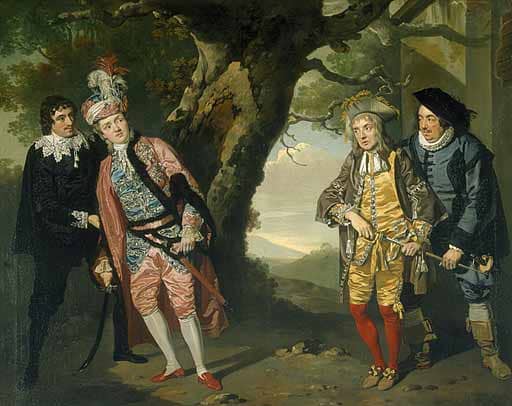Theme of Desire in Shakespeare's "Twelfth Night"

Scene from Shakespeare's "Twelfth Night" in which Viola and Sir Aguecheek are encouraged to fight by Fabian and Sir Toby Belch (Francis Wheatley, 1771)
Desire in Shakespeare's Twelfth Night
Desire is an emotion experienced by all people. Shakespeare presents the desires of the multiple characters in Twelfth Night to emphasize the societal limitations of the characters according to gender, social class, and birthright.
Sixteenth-century society's social class system presents multiple barriers to obtaining desires. Shakespeare's work depicts those barriers with poetic and raucous language.
Historical Background on Sixteenth Century Social Classes
The feudal society of Middle English times only slightly evolved in the 16th century. This was considered the Tudor times. Life was governed by religion and social structure (Abrams, 1999). The Bible decreed the ‘natural order’ accepted by the population, and people generally accepted their place in society. Social classes were divided into several layers. The highest social standing was still nobility.
Below the nobility were religious leaders. Yeomen were middle to large farmers, freely holding their own land and wealth. Husbandmen were small farmers working on rented land and often holding second jobs as laborers. Day laborers comprised most of the population, and females in domestic positions comprised two-thirds of this group. Masters or mistresses employed servants in husbandry typically to do manual labor. At the lowest end of the social ranking were the poor and beggars.
Although 70% of the population were husbandry or below in social status, this was considered acceptable (Abrams, 1999). The nobility and gentry held power over the majority. It was possible to move upward in social class but was more likely to drop downward because of injury, illness, poor crops, or widowhood.
Comedy and Love in Shakespeare's Twelfth Night
William Shakespeare wrote his play Twelfth Night as a comedic view of love, deceit, revenge, and social order. The story follows the protagonist Viola who, after being rescued from a sea wreck, assumes her brother's identity to gain employment. She goes to work for Orsino, the duke of Illyria and falls in love with him. This is obviously complicated since she is disguised as a man. The situation gets further complicated as Orsino sends Viola, disguised as Cesario, to woo Olivia, a countess whom Orsino loves. Olivia has no interest in Orsino and becomes enamored with Cesario.
Beyond this love triangle are Sir Andrew and Malvolio, who each desire to win Olivia as his wife; Maria, Olivia's servant woman, who is in love with Sir Toby, Olivia's uncle; Antonio, the sea captain, who is in love with Viola's brother Sebastian; and the re-emergence of Sebastian to the town of Illyria confusing everyone and revealing Viola's true identity. Each character's social standing presents a bearing on the capability to obtain their desires.
Character Desires in Twelfth Night
The characters of Shakespeare’s Twelfth Night have unique longings that will them to behave in a particular way to obtain their desires.
Viola
Viola desires to obtain employment following the shipwreck, so she disguises herself as a man. This is significant because she could not gain employment because of her gender. By posing as a man, Viola earns respect and a place working directly for the duke. While posing as the man, Cesario Viola falls in love with the duke. She desires his love in return, but he has feelings for the countess Olivia. This is significant because he does not really know the countess and most likely chose her for her beauty and position. Still, he claims undying love for Olivia.
For Viola to achieve her desire, she must follow the wishes of Orsino as her master and find some way to foil the connection between him and Olivia. She mentions this problem “I'll do my best To woo your lady: aside yet, a barful strife! Whoe'er I woo, myself would be his wife” (1.4.7) This proves little problem since Olivia is not interested in Orsino. Viola also desires that her emotions and intelligence be accepted despite the gender stereotype that Orsino believes. Finally, Viola desires to be reunited with her brother, who she loves and believes to be lost at sea.
Orsino and Olivia
Orsino, the duke of Illyria, desires the love of Olivia, but Olivia does not return his love. To obtain his desire, Orsino sends Viola, disguised as Cesario, to win the heart of Olivia. During the first visit, Olivia falls in love with Cesario. She desires this suitor who understands her and speaks to her with such poetic language, and not Orsino, who she believes knows nothing about her. Cesario does not desire Olivia because she is actually a woman and in love with Orsino.
Recommended
Sir Andrew
This man is a friend of Sir Toby, Olivia’s uncle; Sir Andrew desires Olivia for himself. Although he tries to portray himself as brave and worthy of Olivia, he is perceived as a fool by his peers, and Olivia does not desire him. Despite this, Sir Toby makes a plea for his worth “She'll none o' the count: she'll not match above her degree, neither in estate, years, nor wit; I have heard her swear't. Tut, there's life in't, man” (1.3.21)
Malvolio
Malvolio is Olivia’s steward. He mistreats his coworkers and desires to win Olivia’s hand in marriage to gain higher social standing. In the play, he mentions how another servant advanced through marriage “There is example for't; the lady of the Strachy married the yeoman of the wardrobe” (2.5.2). This desire for advancement breeds resentment from his peers, who desire revenge upon Malvolio. They achieve this by giving him a false letter proclaiming love from Olivia. He is made to look foolish, and Olivia believes that he has gone mad. He is locked up for this madness.
Maria and Sir Toby
Maria is Olivia’s waiting-gentlewoman. She is of lower class breeding, and her language and actions provide insight into her social class, “what a caterwauling do you keep here” (2.3.68). Still, she is in love with Sir Toby, Olivia’s uncle. Despite their difference in social roles, Sir Toby marries her for her cunning in tricking Malvolio.
Feste
Feste is the jester, singer, and entertainer of the play. He is regarded as a fool. He plays a role in tricking Malvolio and also setting him free. He interacts with all the characters in various ways, which reveals that he is not a fool at all and may, in fact, be the most intelligent of the crew. His desire varies.
He wishes to go unseen among the people, so he acts the part of the fool which is expected of him. He desires attention, which his antics bring him. Besides these obvious desires that his actions reward him with, he appears to have a deeper desire to be recognized for his own intelligence and ability.
He gains his own revenge on Malvolio by quoting Malvolio’s insults of him “Madam, why laugh you at such a barren a rascal, an you smile not, he’s gagged- and this the whirligig of time brings in his revenges” (5.1.371).
Sebastian and Antonio
Sebastian is Viola’s brother, who is rescued by Antonio. Antonio falls in love the Sebastian which goes against the gender roles and Christian models of the period. Antonio follows Sebastian into Illyria although it is dangerous for him: “I could not stay behind you: my desire, More sharp than filed steel, did spur me forth; And not all love to see you” (3.3.1).
Sebastian goes about town and discovers Olivia. She mistakes him for Cesario and leads him off to marry her. He falls in love with her immediately, and the two are married. His desire is acceptance, love, and understanding of the bizarre situation. Antonio does not win his desire and leaves without Sebastian.
Relation of Characters' Desire to Reality
The characters in Shakespeare’s Twelfth Night offer interesting representations of desires that would be expected among 16th-century people.






